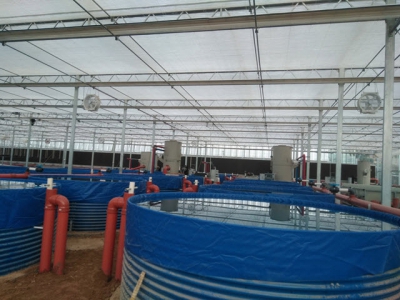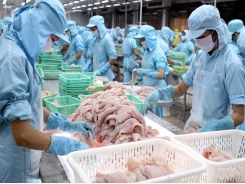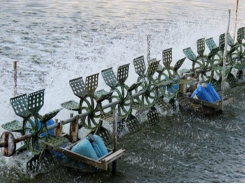Israeli firms plug-and-play RAS solution attracts investment

Aqua-Spark contributes to BioFishency’s latest round of funding
China-Israel Agriculture and Technology Town, Shijiazhuang, China. Photo courtesy of BioFishency.
Despite the global growth in popularity of land-based aquaculture, two major challenges remain for recirculating aquaculture systems (RAS): the limited availability of water and the buildup of toxic ammonia excreted by the fish.
In 2013, Igal Magen and Cobi Levanon sought to solve these issues with two new technologies that, over the past few years, have proven their potential: the SinglePass Biofilter and the Mini-RAS.
Magen, former head of aquaculture at Israel’s Ministry of Agriculture, and Levanon, a marine biologist, formed BioFishency, an Israel-based company that manufactures and sells these RAS water treatment systems.
BioFishency was a recent recipient of funding by Aqua-Spark, a Netherlands-based investment fund for sustainable aquaculture. BioFishency’s latest round of funding brought in $2.4 million in capital, which will be used for sales and marketing, for expansion in China and for furthering new product R&D.
The Single Pass BioFilter (SPB), which costs $10,000 to $20,000, and the Mini-RAS (a system that includes the SPB and starts at $70,000) each aim to improve the survival, growth and reproduction rates of fish, which increases profitability and sustainability for the farmer.
"This process will be more reliable and efficient than a biological filter, which takes a long time to build and is less efficient in cold water."
“We wanted a simple-to-operate, cost-effective technology that would increase yields for farmers and save resources and expenses such as water and land,” Magen said. “We developed a system with high-end technological capabilities but one that’s still accessible to all fish farmers, even those with limited infrastructure and resources.”
The SPB is a water treatment filtration unit that strips carbon dioxide from the water and enriches it with atmospheric oxygen. A chamber in the unit converts ammonia to nitrate and a mechanical filter removes solid waste.
“From there the water goes straight into the pond without any need for chemicals,” Magen said. A mechanical backwash is performed manually once a week and solids are removed for use in irrigation for fertilizer, or sewage. BioFishency refers to this as a “plug-and-play” system because it requires minimal technical expertise, enabling farmers to upgrade their existing facilities using their existing infrastructure.
The Mini-RAS is a full, land-based aquaculture kit that includes fish tanks, piping, the water treatment unit and aerators, and is intended for farmers who want to start or expand their aquaculture operation, and for those who want to convert their farming to one that recycles water and significantly reduces consumption.
“We’ve tried to make this as simple as possible so all you need for this is level land and electricity,” Magen said. The unit’s controls can be operated with or without an Internet connection. BioFishency ships the product to the buyer, installs it over 10 days and operations can begin immediately.

BioFishency installation in Israel, Mini-RAS for hybrid striped bass. Photo courtesy of BioFishency.
“The idea is to have simple technology based on the same concept as a big RAS system, but one that is affordable for small and medium-size fish farmers,” he said.
Both products have appeal, but in different markets, he added. “In Africa we’re selling mostly the Mini-RAS while in China the SPB has been more popular.” To date BioFishency has approximately 36 customers in China, India, Bangladesh, the Congo, Nigeria and Israel, farming species including African and Asian catfish, tilapia, barramundi, hybrid striped bass, European sea bass and koi fish for the ornamental market.
Tom Prins, dealflow manager at Aqua-Spark, said BioFishency’s solution has an especially large potential impact in emerging markets like China, where regulatory bodies identify reduction of water use and reduction in ammonia discharge in water systems as critical concerns. “This was demonstrated clearly with the closing down of a large number of freshwater farms in the country last year,” Prins said. “The company has set up operations in China to serve the growing need for more sustainable production systems.” The Mini-RAS and SPB are most efficient in water temperatures of 18 to 20 degrees-C. For cold water species BioFishency is working on another product for use in land transportation of live product, holding facilities and RAS.
“Basically, we will run an electrical current inside the water to remove ammonia,” Magen said. “This process will be more reliable and efficient than a biological filter, which takes a long time to build and is less efficient in cold water. We’re hoping it will be ready in another year.”
While BioFishency has received significant investment from Chinese investor Xia Sei and the Trendlines Group, the funding from Aqua-Spark represents a great endorsement of its work.
“It’s always nice to have a company like Aqua-Spark joining us because it validates our work until now and where we’re going in the future, reassuring us that we’re on the right track,” Magen said. “We are working in the same markets and they have many companies in their portfolio that are interested in our work. So their support strengthens not just our ability, but our markets, too.”
About Author: Lauren Kramer, a Vancouver-based correspondent for the Global Aquaculture Advocate, has written about the seafood industry for the past 15 years.
Có thể bạn quan tâm
Phần mềm

Phối trộn thức ăn chăn nuôi

Pha dung dịch thủy canh

Định mức cho tôm ăn

Phối trộn phân bón NPK

Xác định tỷ lệ tôm sống

Chuyển đổi đơn vị phân bón

Xác định công suất sục khí

Chuyển đổi đơn vị tôm

Tính diện tích nhà kính

Tính thể tích ao hồ



 Mekong Delta Slump in pangasius price caused huge…
Mekong Delta Slump in pangasius price caused huge…  Shrimp production in chain to meet import market…
Shrimp production in chain to meet import market…